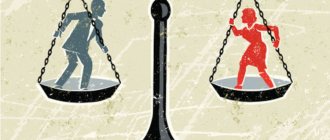With the arrival of a child in the family, the beginning of a new stage in the fate of any woman, because her task is not only to give birth, but also to raise a new little person; the connection with her child remains with the mother for life. Mothers have special relationships with their daughters; unfortunately, it is not always all-accepting and boundless love. Sometimes a grown-up girl becomes convinced that her mother never loved her (and, sometimes, ignores or openly hates her). This discovery becomes a painful blow and can negatively affect the character and fate of the young woman.
Psychology of a mother's lack of love for her daughter
The love of a mother for her daughter - it would seem that what could be stronger in this world? Every woman with a developed maternal instinct cannot imagine life without her child.
But sometimes there really are situations when a mother experiences real hostility towards her own daughter. Why is this happening? Psychologists name two main reasons for this behavior.
- Feeling of competition
A common reason why a mother does not love her daughter is banal jealousy of the head of the family. Fathers tend to pay more attention to their children. Wives get less. When a child appears in a family, competition arises. But in normal families this does not cross the line.
The Oedipus complex also plays a big role in this. Its essence lies in the fact that a child always loves the parent of the opposite sex more: a son loves his mother, a daughter loves his father. Moreover, the older children become, the more noticeable this is. The action of this complex begins from the age of 3.
Therefore, competition arises between the daughter and mother for the attention of the head of the family.
- Projecting one's own complexes onto the child
A daughter will always be younger and fresher than her mother. Therefore, it is a reminder of age for a woman. If the mother has complexes about this, then this becomes a reason for hostility towards the young girl.
A child may be more successful in something that the mother is unable to do. This can also cause negative emotions.
Who should I be?
Psychologists, telling why mothers do not love their daughters, describe numerous situations of role reversal. This happens when a woman becomes a mother, who, due to her age or character, is not yet ready for such responsibility, and as soon as she has the opportunity, she shifts everything onto the shoulders of the child. The woman behaves as if she were a child herself, and the girl, willy-nilly, has to try to be an adult. Thus, the daughter loses the opportunity to live her childhood normally, and the eldest constantly feels guilty for what is happening.
Another situation is also possible: the girl is gradually growing up, but the mother does not want to accept what is happening and resists reality in every possible way. Among the reasons identified in psychology for why mothers do not love their daughters, special attention is paid to this particular situation. Despite the child’s age, the woman still perceives her as small, takes care of her in every possible way and does not allow her to live her own life. Neither the eldest nor the youngest in such conditions get the opportunity to build a personal life, get involved in interesting things or comprehend new things.
Signs of maternal dislike for her daughter
It is simply impossible not to notice the lack of love between a mother and her daughter. This can be seen in behavior, attitude towards the child and even conversation with him. While hostility can be disguised for others, the girl herself constantly feels negativity from her parent.
The following signs when a mother does not love her adult daughter are most common.
- Mother is not involved in upbringing
Parenting is an important and responsible matter in which both parents must take part. If a mother dislikes her child, then taking care of him becomes a difficult task for her. Therefore, the woman does not want to participate in her daughter’s life, is not interested in her affairs at school or at work, or in her personal life. You shouldn’t expect advice from such a mother on this or that issue.
- When communicating with your daughter, a negative range of emotions predominates
A clear sign that the mother does not love her daughter is when communication with the child brings the woman only negative emotions. Therefore, she tries to refrain from talking and does not ask how her day was. It becomes impossible to have a heart-to-heart talk with your mother.
Also, in communication, unloved daughters often hear only reproaches. Instead of affectionate words - sheer negativity: “lazy person”, “armless”, “mediocre” and so on. The mother does not notice the child’s merits and talents, she only notes his shortcomings.
- Pays more attention to another child and puts emphasis on this
If there are several children in a family, you may notice that the mother pays more attention to the other child. She spends all her free time with him, constantly communicates, and takes an active part in his upbringing. The unloved daughter is deprived of all this.
Also, the mother always singles out her favorite, talks about his merits, about reverent feelings for him. While he doesn’t value his daughter at all, he speaks badly about her. Constantly compares his children, but everything positive goes only to his beloved child.
Uneven treatment from a parent has a negative impact on the daughter. Possible consequences include:
- decreased self-esteem;
- the habit of being critical of oneself;
- the emergence of confidence in one’s own uselessness and unlovability;
- developing a tendency towards inappropriate behavior to attract the attention of parents;
- development of a depressive state.
Due to constant comparison, the relationship not only with the mother, but also with brothers/sisters deteriorates. When a daughter grows up and leaves her father's house, the relationship almost always remains the same.
- Talks about his dislike for his daughter
The mother is able to speak directly about her negative attitude towards her daughter. At the same time, a woman can often be more restrained in front of others, be hypocritical, and demonstrate love. Typically, this behavior is observed in situations where the daughter has talents and grows into an outstanding personality.
This sign, indicating that the mother does not love her daughter, is often found in families where the parent is trying to use the child as a way to achieve material well-being, success, and recognition in society. Therefore, in front of others, she plays the role of a caring mother who helps in everything, and at home she turns into an overseer, constantly demanding the impossible for her personal goals.
How to learn to trust your daughter and let her go
Previously, it was simply a feat for me to let my daughter go.
Allow her to go to school on her own, decide for herself what to wear on the street, study on her own without control on my part. Letting go is a very important moment in a girl's life. At a certain time, a mother needs to allow her daughter to be independent. It is necessary to reduce the control associated with studying, with clothes and with friends. You can give advice and accompany. But don't control it. Otherwise, the daughter will not have the opportunity to grow up.
Grow up correctly. Growing up, going through your life lessons, getting your head in, gaining your experience. In order to grow up in due time, and not at 35 years old.
To do this, a mother needs to learn to trust her daughter, to trust the world. But how to do this? This is where women's fairy tales come to the rescue. They describe basic women's values, show possible scenarios for the development of women's destiny, and reveal the main pitfalls and dangers. By living fairy tales with your daughter, you can teach her “smartness,” warn her, and show her the consequences of her actions. But the main thing is to explain that in life, as in a fairy tale, the end is always logical. Wonderful fairy tales for girls' education - “Cinderella”, “Morozko”, “Geese and Swans”, “The Princess and the Pea” and many others.
Is it possible to improve the situation?
A bad relationship with her mother and a feeling of unlove on the part of a parent have an adverse effect on the girl’s psycho-emotional state. The following consequences arise:
- Lack of self-confidence and own strengths. If the mother's love was absent, the daughter develops the understanding that she cannot be loved by anyone at all. This prevents you from building relationships with the opposite sex in the future.
- Distrust of other people. The girl constantly feels that everyone around her is being a hypocrite, deceiving her, that people are incapable of experiencing sincere feelings. Because of this, relationships with others do not go well, there are no friends, and it is difficult to build serious relationships with guys.
- Inability to adequately assess one's capabilities and external data. This makes it difficult to exist normally in society. Everything around seems to be better. A critical attitude towards oneself is developed; only shortcomings are seen everywhere.
- Over-perceiving everything that happens. Unloved daughters often take things too personally. This increases the risk of developing stress and depression. With such sensitivity it is extremely difficult to succeed in life.
To avoid such consequences, it is important for parents to remember that their love is the most important thing for children. When a woman decides to give birth to a child, she must understand the full extent of her responsibility towards him.
If a bad relationship with your mother has already developed, it is not always possible to correct it. You won’t be nice by force, no matter how hard you try. Therefore, you should not try to deserve the attention of your parent by sacrificing something of your own. It will be possible to change the situation if the mother herself realizes all the negativity of her behavior and loves her daughter.
If there are no trembling feelings, then no matter what you try to do, everything will be perceived by the woman critically or indifferently. You can't force someone to love. There is no point in calling for conscience either. This will not produce the desired results. Growing up without a mother's love is very difficult. But the hardest thing is trying to get her.
Don't be negative towards your mom. You may not show her much love. But at least respect it. Even though she couldn't love you, she gave you life. You can be grateful for this already. Then you should live according to your own scenario without the participation of a parent.
You should pay more attention to yourself. The consequences of the lack of maternal love inevitably affect the psycho-emotional state. It needs to be brought into proper condition, self-esteem and self-confidence raised in order to successfully move on.
But, first of all, it is important to forgive everything that has accumulated over many years of unlove from the mother, all the grievances. Just let it go. While you were little, you couldn’t change anything, you had to continue living in a negative environment. But now that you are an adult, you can change your life for the better.
If a mother does not love her daughter, there is no need to justify her. Yes, perhaps she really didn’t have enough strength for psychological and emotional moments, because her life was difficult, she had to carry life alone, feed her family, and so on. Don’t look for excuses for her, just accept her for who she is and pay attention to yourself.
There is no need to constantly rush around with childhood psychological traumas, complain about life, about your parents, or explain your failures by lack of love on the part of your mother. Make sure that your reality is not similar to what it was in childhood.
You may need to seek help from a psychologist to eliminate psychological problems. Classes with a specialist will allow you to improve your own life, become more confident, and change your attitude towards people around you.
The main thing you need to remember is that in the future you will also become a mother. Therefore, you, like no one else, understand that love for your child is very important for the full development of a person. Your baby needs a healthy mother - both physically and mentally. Therefore, take care of yourself, do not waste time trying to unsuccessfully earn the attention of an unloving mother.
Signs of a normal relationship between parents and adult daughter
Finally, I would like to touch on the topic of signs of a normal relationship between parents and their grown daughter. Such a discussion will help you understand what you should strive for when interacting with your child. What factors are included in a harmonious relationship? Let's figure it out.
Signs of a good and strong relationship with an adult daughter:
- you often talk on the phone and tell each other about your sorrows and joys;
- you consult with your daughter on important issues and respect her opinion;
- you want to see your grown child as often as possible;
- if your daughter encounters difficult situations in life, then she may come to you for advice, without warning. After all, she knows that she will always be welcome at home;
- if misunderstandings arise between you, then you try to resolve them “on the shore”, without getting into hysterics and scandals;
- your daughter is sincerely concerned about your well-being;
- she trusts you with raising her grandchildren;
- you never try to criticize your adult child for no reason, wanting to raise your own self-esteem or bad mood.
Mothers and Daughters - how to build healthy relationships
As can be understood from all of the above, the ideal relationship between parents and daughter is built on mutual understanding, support and unconditional love, which does not pursue any selfish goals. Only under such conditions will the connection between generations be truly reliable and filled with affection and care.
Article updated: 05/13/2020
conclusions
Thus, psychology identifies various reasons why a mother does not love her daughter. This could be the projection of one’s own complexes, jealousy towards the head of the family, envy and much more. Dislike can start from the birth of a child or develop as the daughter grows up.
It is difficult to correct such a negative situation. You cannot force someone to love you. Therefore, you should not try to please a woman in everything. Also, don't be critical of yourself. An unloving mother's opinion of you is not an indicator of reality.
And how to get out of the circle of problems?
A simple attempt to understand why there is no maternal love is unlikely to lead to anything good. An unloved child only sinks deeper into the awareness of his shortcomings and their significance. Even having found out why this happens in a particular case, it is difficult, if not impossible, to change something in yourself - after all, parents cannot be chosen and corrected.
Finding yourself in such a situation, having realized your mother’s dislike, you must try to eliminate the habit of pleasing your mother from your everyday life, and also begin to work on understanding your own positive personal characteristics.
Sooner or later, an unloved girl can also become a mother. If this happens, you need to be able to maintain a balance: not to repeat the mistakes of which she was a victim in childhood, but also not to love the child too much, not allowing him to take a step without parental control. The best option is a course of psychological support that helps solve the problem of relationships with the mother, and when planning a pregnancy and soon after childbirth, communication with a family psychotherapist who will help build a correct and healthy relationship with your child.
If anyone but me?
If you think about why mothers don’t love their daughters from their first marriage, the answer usually seems obvious: they draw parallels between the child and the father with whom they separated, which means the memories remain bad. A woman is trying to start her life from scratch, but the child is always nearby, like a living reminder of the mistakes she has made. But the situation is not always explained in such a simple way. Perhaps the cause of all the problems is the narcissism of the older woman, convinced that the world should revolve around her. Often it is from such women that men run away, despite having a child together, who has to endure the nature of the parent.
Some women firmly believe that the world exists to satisfy their needs. They believe that the people around them are created to serve them, and this applies to their own children. For such a mother, it may be normal to raise a hand to the child or to mock her morally, and if in addition to the girl there is also a boy, it may be clear to explain why the mother loves her son more - as long as the daughter realizes her insignificance and is ready to extol and praise the parent, who is superior to her in everything .
Mothers of this type can explain the existence of children only as an object to serve their interests - that is why they give birth to them. If the child does not provide help, he should not be disturbed and show himself as little as possible. Of course, children growing up in such conditions are sure that they were born in vain. They consider themselves inferior and often live their entire lives alone.
Relationship with adult daughter
Conflicts are not uncommon in this case either. It would seem that the child has grown up, you need to forget about all the differences and just enjoy communication. Moreover, now she also has a lot of her own affairs and worries, so spending the whole day together becomes problematic. But conflicts between them happen very often. Why does a mother hate her adult daughter? There can be many reasons:
— The daughter is perceived as a little girl. There may be several reasons for this. This is the fear that the girl will grow up and leave. And her mother constantly proves to her that she is stupid, doesn’t know how to do anything and should listen to advice. There is another option. The mother is afraid of old age and death, so she suppresses her daughter’s natural desire to grow up. As long as she remains small, mom will be young. — The views on life of a girl who is already 20 or 30 years old can be very different from those held by her mother. This applies to the choice of profession and life partner. And the reason for this usually lies in the mother’s unfulfilled dreams. Through their children, parents try to realize what they failed to achieve. That is, the mother is trying to make her daughter happy, the way she wanted to be. But the tragedy is that she has her own ideas about happiness. This gives rise to conflicts and mutual hatred. — Competition with my daughter. And this also happens. Why do mothers hate their daughters? Because they are young, beautiful, loved and successful. That’s why they try every time to show in word and deed that they can do everything much better. This is usually observed in those women who, in childhood, were given other children as examples. This mechanism was established for many years. — Clarification of relationships and making claims. The reason is this: at one time, my mother obeyed her parents and gave up her own desires. She expects this from her child. Essentially, it is based on the desire to receive recognition and gratitude. She once sacrificed a lot for her daughter. And now she could spend time with her mother, and not go on a date.
What character traits prevent those who were not loved in childhood from living?
Perhaps your current relationships with people are harmed by personality traits that you acquired as an unloved child. Which of this list is relevant to you?
Uncertainty. An unloved daughter does not know that she deserves love and attention; she grew up in an environment where she was ignored, unheard, or criticized at the slightest reason. Her mother's voice sounds in her head, telling her what she is not - smart, beautiful, kind, loving, efficient. This voice will continue to poison her joy from achievements and prevent her from revealing her talents, if it is not silenced.
Mistrust. A receptive and loving mother teaches her child that the world is safe, that it is a place where his needs are met, questions are not left unanswered, and someone will support him in case of troubles or difficulties. A daughter with a secure attachment does not find it difficult to rely on people; she does not feel vulnerable when she trusts others because of her worldview and confidence in her own judgment.
Before the unloved daughter, the world appears completely different - full of threats and populated by people capable of hurting or failing. “I always wondered,” one woman admits, “why someone wants to be friends with me. I couldn’t get rid of the thought that there was a catch here, and during psychotherapy I learned that all this comes from childhood.” The trust problem stems from a sense of fundamental insecurity in the relationship with the mother and extends to both friendships and romantic relationships.
Difficulty setting boundaries. Receptive mothers teach children from infancy a healthy measure of dependence and independence, respecting their emotional and physical personal space, which is not intruded upon. This reinforces both the child’s independent self (“you are you, and that’s good”) and a sense of secure connection (“if you fall, mommy will be there to help you”).
In contrast, an unloved daughter who has been ignored has a hard time feeling like an independent person because she is too focused on getting her mother's attention. She often plays the same role in adult life, selflessly pleasing others and suffering from the inability to say “no.” She literally disappears into relationships because she doesn't understand how boundaries between people work.
Inadequate self-esteem. We learn who we are by observing the facial expressions with which other people, especially mothers, look at us, and how they react to us, our words and actions. One by one, these signals shape self-perception from early childhood. A loving and sensitive mother helps the child not only develop a positive image of himself, but also accept himself. Acceptance allows you to see yourself as a whole person with all your strengths and weaknesses. The main thing is that you can achieve a lot without being perfect, because you know that you will be loved and accepted anyway.
Unfortunately, none of this happens if the mother does not love her daughter. Since the mother's behavior directly affects the child's self-perception, it is difficult for all unloved daughters to look at themselves objectively. Many have absorbed their mother's neglect and humiliation, becoming overly self-critical - accustomed to attributing any failure or problem not to circumstances, but to their personality traits and character traits, and considering themselves worthless or failures.
Hypersensitivity. For many daughters, words and gestures are emotional triggers that make them remember how they were treated as children. Being sensitive to slights, real and imagined, and overreacting to any criticism is extremely unproductive and makes life very difficult. A woman may perceive good-natured banter as criticism, obsessively replaying a random phrase in her mind. Due to her childhood experience, she tends to see hidden meaning in meaningless situations and mistakenly interpret the intentions and motives of other people.
Repetition of the mother bond in adult relationships. The search for a comfort zone, in which there is nothing comfortable, forces the unloved daughter to strive for connections in which she feels the same as in childhood. “To be honest, I married my mother,” says one woman. “He seemed the complete opposite of my mother, but in the end he began to treat me the same, with the same inconsistency, and again I did not know how I would be treated. Like my mother, he was sometimes indifferent, sometimes sensitive, mercilessly critical or vaguely approving.” Many of you will agree that this woman was not the only one who chose a partner modeled after her mother.
My home is my castle
In our country, the way of life is such that generations coexist together within the walls of one house. This is relatively lucrative from a financial point of view, but getting along can be difficult, and the hardest part is for mother and daughter. As the child grows up, they both find themselves housewives, and their views on the rules of behavior, the conduct of affairs in the house, and in their personal lives are fundamentally different. A particularly pronounced conflict is observed if there are no men in the family.
Often, during an appointment with a psychologist, it turns out that the underlying cause of the problem is jealousy. This is typical if mother and daughter live together and the girl has a fiancé. An adult woman begins to actively teach the child what and how to do, what is right and what is wrong. The mother points out where and what her daughter is doing ugly and wrong, and in front of the groom she can joke about the girl or make unflattering remarks and witticisms addressed to her. This is more typical of a situation where a mother raised her daughter without a father - such a woman is obviously dissatisfied with the way her personal life has turned out, and this is reflected in her communication with her daughter, for whom, it would seem, everything is going fine. The child has blossomed, has entered the brightest time of his life, has a huge number of paths, good choices, while the mother, it seems, has no future. This gives rise to jealousy and even unconscious envy, which leads to conflicts of varying degrees of tension.
Sometimes jealousy is observed on the part of the daughter - for example, if the mother has a significant other. Others have an extremely negative attitude towards this, believing that the father’s place is sacred, and a stranger has no right to claim it.
“My dad didn’t raise me, things didn’t work out with my husbands”
Olga's mother gave birth at the age of 16. The girl was raised by her grandmother and great-grandmother.
“My grandmother took care of me, prepared my homework with me. I know Grieg, Tchaikovsky, Chopin and the classics of Russian literature solely because my grandmother instilled an interest in me. But we were not the most exemplary unit of society in the classical sense, and at school I was considered a child from a dysfunctional family,” says Olga.
Women's fate did not work out for either the great-grandmother, the grandmother, or Olga's mother.
Olga had been talking about marriage since kindergarten - she really wanted a real family.
And the adults made fun of her: “Olya didn’t even have time to learn to speak, she tormented everyone with the question of when she should get married.”
He remembers an incident in kindergarten. Mom then lived with a man whom Olga could not stand, but from time to time he could pick her up from kindergarten. And then one day the teacher says: “Olya, dad is behind you.”
“I decided I wouldn’t go, but the teacher said that this is my real dad.” He came from the army and immediately came to me in kindergarten. I still remember its smell. Then he left, and I found him myself, many years later. Now I call him by his name - Oleg. And all my life I dream of a full-fledged family.
For the first time, Olga got married early, but a few years later the family broke up. In her second marriage, she had two sons. Daniil is 22 years old today, Denis is 18.
Olga was happy with her second husband. She even fell in love with this man, although she got married without feelings. She was just grateful that he took care of her, even tying her shoelaces. She wanted warmth, love, attention.
Olga suggested going to Moscow to earn money to buy an apartment. We left, but it didn’t work out. Everything the husband earned was lost in the casino.
Olga returned to Barnaul, where her sons were left to be raised by her grandmother. Hope for family happiness collapsed when the husband returned with nothing. She cried, listened to my mother’s thoughts on the topic “why do you need this” and broke up with her husband.
After the divorce, Olga returned to Moscow to work, but after some time she left to join her sons.
- I'm a doctor. She sent everything she earned in Moscow home - to her mother, her cancer-stricken grandmother and her children. But it was hard for me that they were growing up without me,” she says.
Unloved child
In all literary, musical and artistic works, the image of the mother is glorified as gentle, kind, sensitive and loving. Mom is associated with warmth and care. When we feel bad, we voluntarily or involuntarily shout “Mom!” How does it happen that for some people a mother is not that way? Why do we increasingly hear: “What should I do if my mother doesn’t love me?” from children and even adults.
Surprisingly, such words can be heard not only in problem families, where parents fall into the risk group category, but also in families, at first glance, very prosperous, where everything is normal in the material sense, the mother takes care of the child, feeds him, clothes him , escorts you to school, etc.
It turns out that you can fulfill all the duties of a mother on a physical level, but at the same time deprive the child of the most important thing - love! If a girl does not feel her mother's love, she will go through life with a bunch of fears and complexes. This also applies to boys. For a child, the internal question is: “What should I do if my mother doesn’t love me?” turns into a real disaster. Boys, in general, having matured, will not be able to relate normally to a woman; without noticing it themselves, they will unconsciously take revenge on her for the lack of love in childhood. It is difficult for such a man to build adequate, healthy and fulfilling, harmonious relationships with the female sex.
Instead of an afterword
If you are a mother whose relationship with her daughter is not going well, if right now you are in pain, you feel bad, you are suffering because you are unable to change the current situation, if you are a daughter who wants to run away from her mother, who believes that her mother never gave her anything, if this is your strong belief, but somewhere deep down in your soul you still understand that you are wrong, but you can’t help yourself, contact us!
We will help you get out of this situation with dignity, because we have a very effective and safe method for normalizing relations between children and parents.
You can write to us from the “Contacts” page. Do this right now if you have already realized that you will not improve the relationship on your own!
What should a parent do if a 3-year-old child says that he doesn’t love his mother and might even hit her?
This situation is often a consequence of emotional instability. Perhaps the child is not receiving enough attention. Mom doesn't play with him, there is no physical contact. The baby needs to be hugged, kissed often and told about his mother’s love for him. Before going to bed, he needs calming, stroking his back, reading a fairy tale. The situation between mom and dad is also important. If it is negative, then you should not be surprised by the child’s behavior. If there is a grandmother in the family, then her attitude towards mom and dad is a powerful influence on the child’s psyche.
In addition, there should not be too many prohibitions in the family, and the rules are the same for everyone. If a child is too capricious, then try to listen to him, find out what is bothering him. Help him, show him an example of how to calmly resolve any difficult situation. This will be an excellent building block in his future adult life. And all fights, of course, need to be stopped. When swinging at his mother, the child needs to, looking clearly into the eyes and holding his hand, firmly say that he cannot hit his mother! The main thing is to be consistent in everything, act calmly and judiciously.











